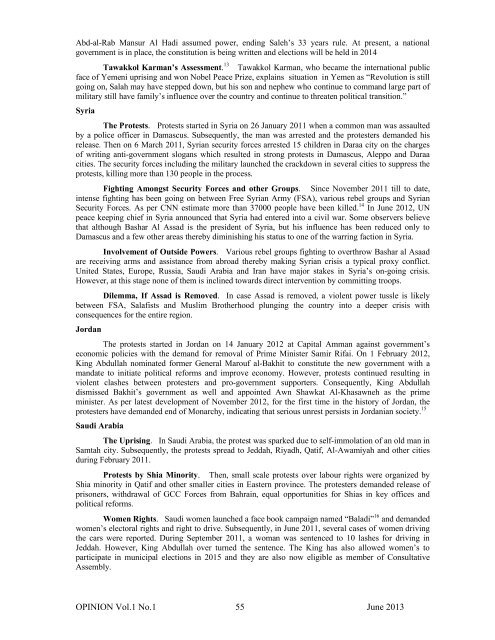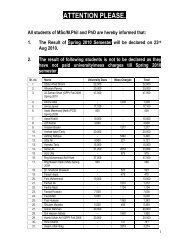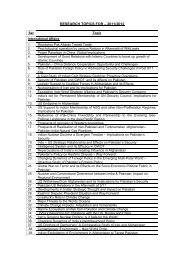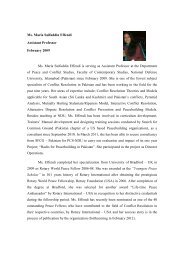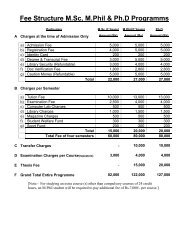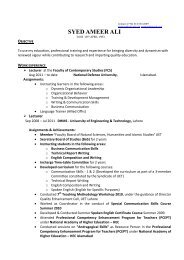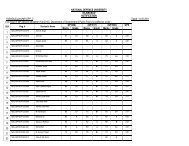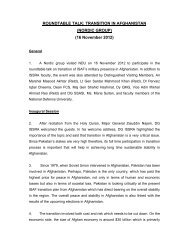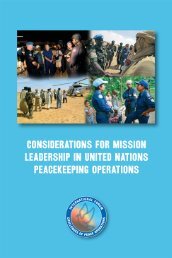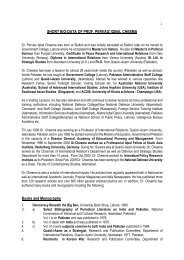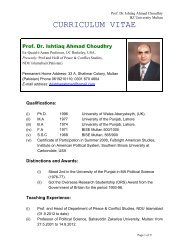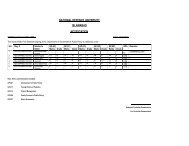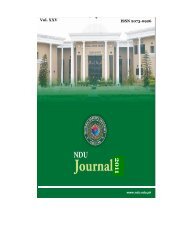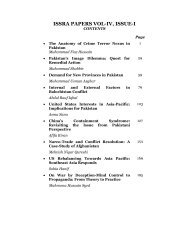OPINION Vol.1, No.1 June 2013 - National Defence University
OPINION Vol.1, No.1 June 2013 - National Defence University
OPINION Vol.1, No.1 June 2013 - National Defence University
Create successful ePaper yourself
Turn your PDF publications into a flip-book with our unique Google optimized e-Paper software.
Abd-al-Rab Mansur Al Hadi assumed power, ending Saleh’s 33 years rule. At present, a national<br />
government is in place, the constitution is being written and elections will be held in 2014<br />
Tawakkol Karman’s Assessment. 13 Tawakkol Karman, who became the international public<br />
face of Yemeni uprising and won Nobel Peace Prize, explains situation in Yemen as “Revolution is still<br />
going on, Salah may have stepped down, but his son and nephew who continue to command large part of<br />
military still have family’s influence over the country and continue to threaten political transition.”<br />
Syria<br />
The Protests. Protests started in Syria on 26 January 2011 when a common man was assaulted<br />
by a police officer in Damascus. Subsequently, the man was arrested and the protesters demanded his<br />
release. Then on 6 March 2011, Syrian security forces arrested 15 children in Daraa city on the charges<br />
of writing anti-government slogans which resulted in strong protests in Damascus, Aleppo and Daraa<br />
cities. The security forces including the military launched the crackdown in several cities to suppress the<br />
protests, killing more than 130 people in the process.<br />
Fighting Amongst Security Forces and other Groups. Since November 2011 till to date,<br />
intense fighting has been going on between Free Syrian Army (FSA), various rebel groups and Syrian<br />
Security Forces. As per CNN estimate more than 37000 people have been killed. 14 In <strong>June</strong> 2012, UN<br />
peace keeping chief in Syria announced that Syria had entered into a civil war. Some observers believe<br />
that although Bashar Al Assad is the president of Syria, but his influence has been reduced only to<br />
Damascus and a few other areas thereby diminishing his status to one of the warring faction in Syria.<br />
Involvement of Outside Powers. Various rebel groups fighting to overthrow Bashar al Asaad<br />
are receiving arms and assistance from abroad thereby making Syrian crisis a typical proxy conflict.<br />
United States, Europe, Russia, Saudi Arabia and Iran have major stakes in Syria’s on-going crisis.<br />
However, at this stage none of them is inclined towards direct intervention by committing troops.<br />
Dilemma, If Assad is Removed. In case Assad is removed, a violent power tussle is likely<br />
between FSA, Salafists and Muslim Brotherhood plunging the country into a deeper crisis with<br />
consequences for the entire region.<br />
Jordan<br />
The protests started in Jordan on 14 January 2012 at Capital Amman against government’s<br />
economic policies with the demand for removal of Prime Minister Samir Rifai. On 1 February 2012,<br />
King Abdullah nominated former General Marouf al-Bakhit to constitute the new government with a<br />
mandate to initiate political reforms and improve economy. However, protests continued resulting in<br />
violent clashes between protesters and pro-government supporters. Consequently, King Abdullah<br />
dismissed Bakhit’s government as well and appointed Awn Shawkat Al-Khasawneh as the prime<br />
minister. As per latest development of November 2012, for the first time in the history of Jordan, the<br />
protesters have demanded end of Monarchy, indicating that serious unrest persists in Jordanian society. 15<br />
Saudi Arabia<br />
The Uprising. In Saudi Arabia, the protest was sparked due to self-immolation of an old man in<br />
Samtah city. Subsequently, the protests spread to Jeddah, Riyadh, Qatif, Al-Awamiyah and other cities<br />
during February 2011.<br />
Protests by Shia Minority. Then, small scale protests over labour rights were organized by<br />
Shia minority in Qatif and other smaller cities in Eastern province. The protesters demanded release of<br />
prisoners, withdrawal of GCC Forces from Bahrain, equal opportunities for Shias in key offices and<br />
political reforms.<br />
Women Rights. Saudi women launched a face book campaign named “Baladi” 16 and demanded<br />
women’s electoral rights and right to drive. Subsequently, in <strong>June</strong> 2011, several cases of women driving<br />
the cars were reported. During September 2011, a woman was sentenced to 10 lashes for driving in<br />
Jeddah. However, King Abdullah over turned the sentence. The King has also allowed women’s to<br />
participate in municipal elections in 2015 and they are also now eligible as member of Consultative<br />
Assembly.<br />
<strong>OPINION</strong> <strong>Vol.1</strong> <strong>No.1</strong> 55 <strong>June</strong> <strong>2013</strong>


